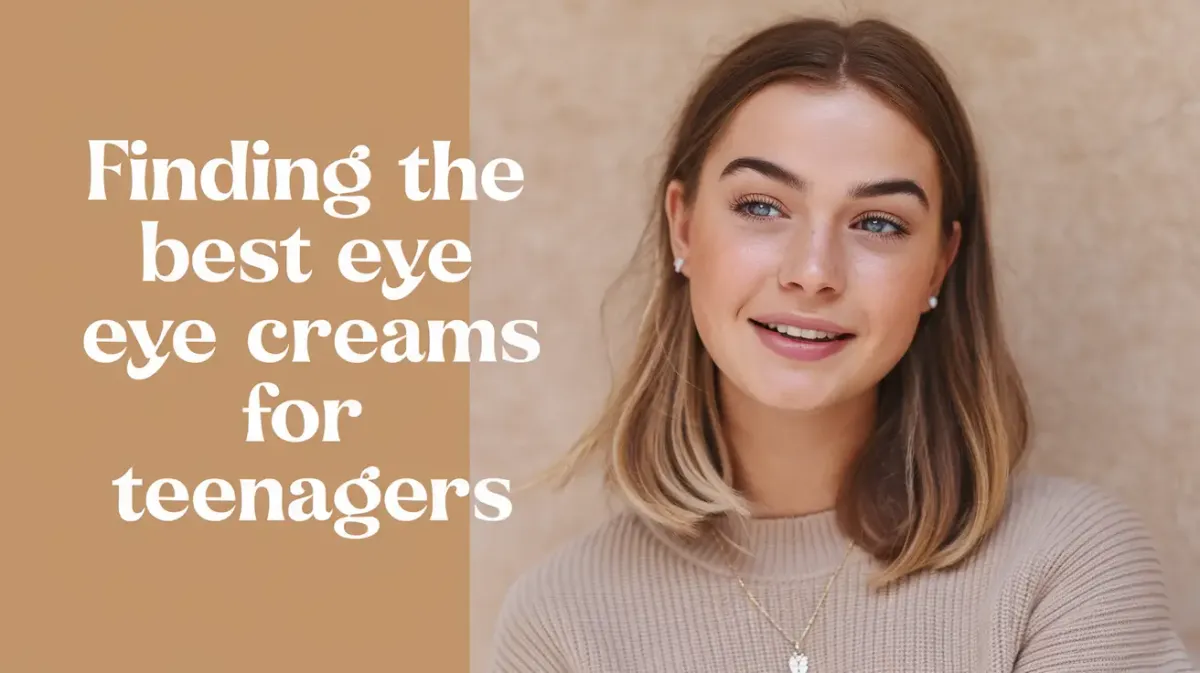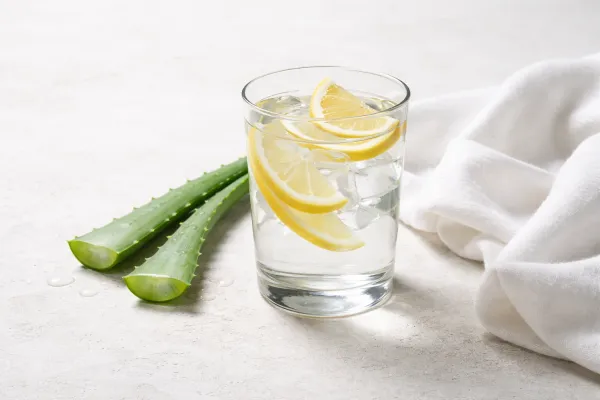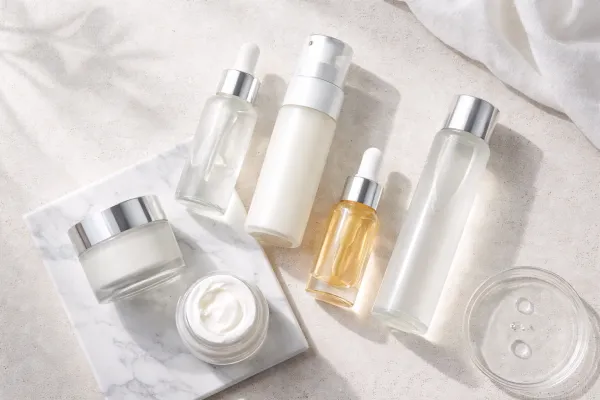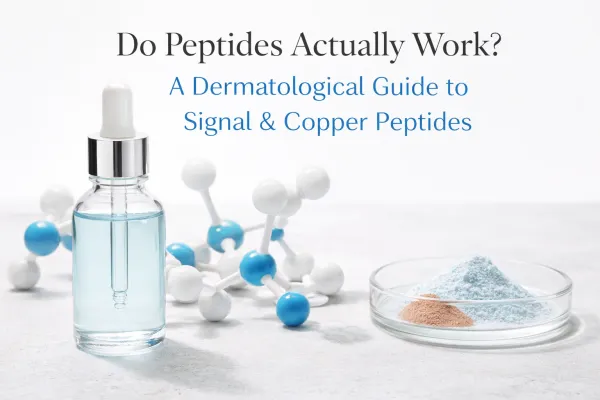Unlocking the Secret to Bright Eyes: Finding the Best Eye Creams for Teenagers
Discover the best eye creams for teenagers! Learn about key ingredients, application tips, and how to choose the right product for youthful, radiant eyes.

Ever wondered why some teens seem to have that effortless glow, even when they're pulling all-nighters for exams?
A big part of it could be their skincare routine, and specifically, the eye cream they use.
Yes, you heard that right.
Eye cream isn't just for your grandma; it's a game-changer for young skin too.
Finding the best eye creams for teenagers can feel like navigating a minefield, but it doesn't have to be. Let's dive into what makes a great eye cream for teens and how to choose the right one for you.
Key Takeaways: Best Eye Creams for Teenagers
- Hydration is Key: Look for ingredients like hyaluronic acid to keep the delicate under-eye area moisturized.
- Gentle is Crucial: Avoid harsh chemicals and fragrances that can irritate young skin.
- Targeted Ingredients: Caffeine helps with puffiness and dark circles, while Vitamin C offers antioxidant protection.
- Proper Application Matters: Use a gentle touch and pat the cream into the skin, don't rub.
- Sun Protection is Essential: Consider eye creams with SPF for added protection against sun damage.
Why Teenagers Need Eye Cream
Okay, let’s get real.
You might be thinking, "Eye cream? Isn't that for old people?"
But here’s the thing: the skin around your eyes is super thin and delicate. It's often the first place to show signs of stress, lack of sleep, and even the early effects of sun damage.

As a teenager, you're probably dealing with late nights studying, early mornings for school, and maybe even some hormonal changes. All of these can lead to dark circles, puffiness, and dryness around your eyes. That's where a good eye cream comes in. It's not about fighting wrinkles (yet!), but about keeping that delicate area hydrated, protected, and looking its best.
I've seen countless teens come into my clinic with these concerns, and a simple, targeted eye cream can make a world of difference. It's about prevention and maintaining youthful skin from the get-go, not just fixing problems later on. Think of it as an investment in your future skin health. It's like starting a healthy habit early, like brushing your teeth or using sunscreen, that will pay off big time down the road.
- Teenage skin is prone to dehydration and sensitivity.
- The under-eye area shows signs of fatigue and stress quickly.
- Early care can prevent future skin issues.
- Eye cream helps maintain hydration and protect against environmental damage.
Sunscreen is also an important factor in protecting the delicate skin around your eyes.
Key Ingredients to Look for in Eye Creams for Teenagers
Now, let’s talk about what actually goes *into* these magical potions. Not all ingredients are created equal, especially for young skin. You want to steer clear of harsh chemicals and focus on gentle, effective ingredients. Think of it like this: you wouldn't use a heavy-duty cleaner on a delicate piece of clothing, right? Same goes for your skin.
Hyaluronic acid is a superstar for hydration – it’s like a big drink of water for your skin, and it's super gentle. Caffeine is another great one, especially if you're dealing with puffy eyes or dark circles; it helps to constrict blood vessels and reduce that tired look. Vitamin C is your antioxidant best friend, protecting your skin from environmental damage and adding a bit of brightness. Peptides are like little building blocks that help to keep your skin firm and healthy.
And don't forget about niacinamide, which can help with hydration, skin elasticity, and even reduce excess oil. These ingredients are the workhorses that will keep your under-eye area looking fresh and healthy. It’s not about using a million different things, but about using the *right* things.
- Hyaluronic Acid: Provides deep hydration without irritation.
- Caffeine: Reduces puffiness and dark circles.
- Vitamin C: Offers antioxidant protection and brightens the skin.
- Peptides: Support collagen production for firmer skin.
- Niacinamide: Improves skin elasticity and reduces excess sebum.
For more information on how to keep your skin healthy, check out a beginner's skincare routine for teens.
Ingredients to Avoid in Teen Eye Creams
Just as important as knowing what to look for is knowing what to avoid. Some ingredients that are great for older skin can be too harsh for teenagers. Think of it like this: you wouldn't give a toddler a super spicy meal, right?
Similarly, you want to avoid high-strength topicals like retinoic acid, hydroquinone, and glycolic acid. These can be too irritating for the delicate skin around your eyes and can cause redness, dryness, and even peeling. It’s also a good idea to stay away from products with a lot of fragrance, as these can trigger allergic reactions or sensitivities. The goal is to be gentle and nourishing, not aggressive and irritating.
Remember, less is often more, especially when it comes to skincare for young skin. It's about supporting your skin's natural balance, not overwhelming it with harsh chemicals. I've seen so many teens come in with irritated skin from using products that were too strong, so starting with gentle options is always the best approach.
- Retinoic acid: Can cause irritation and dryness.
- Hydroquinone: Too harsh for young skin.
- Glycolic acid: Can be too irritating.
- Fragrances: Can trigger allergies and sensitivities.
- High concentrations of active ingredients: Can overwhelm young skin.
If you're dealing with sensitive skin, you might find our guide on teenage skincare for sensitive skin helpful.
How to Apply Eye Cream Correctly
Okay, so you’ve got your eye cream, but how do you actually use it? It’s not as simple as slapping it on and hoping for the best. The skin around your eyes is delicate, so you need to be gentle. Use your ring finger to apply the cream – it's the weakest finger, so it naturally has a lighter touch.
Start by dabbing small dots of cream under your eyes, starting from the inner corner and moving outward. Avoid getting too close to your bottom eyelashes, as this can cause irritation. And here’s the golden rule: pat, don’t rub. Rubbing can actually damage the delicate skin and cause more harm than good.
Think of it like gently tapping a baby's skin – you want to be super careful and avoid any harsh movements. This technique helps the cream absorb properly without causing any unnecessary stress to the skin. I always tell my young clients to be patient and gentle with their skin; it's not about rushing the process, but about being mindful and caring.
- Use your ring finger for application.
- Apply small dots under the eyes, moving from inner to outer corner.
- Avoid applying too close to the bottom eyelashes.
- Pat the cream into the skin, don't rub.
- Be gentle and patient during application.
For more tips on skincare application, you might find our article on how to do skincare for beginners useful.
The Importance of Lightweight Formulas
When it comes to eye creams for teenagers, lightweight is the name of the game. Heavy, greasy formulas can clog pores and cause breakouts, which is the last thing you want. Think of it like wearing a heavy coat in the summer – it’s just too much and can feel uncomfortable.
You want an eye cream that feels light and absorbs quickly into the skin, leaving no greasy residue. This is especially important if you have oily or combination skin. A lightweight formula will provide the hydration you need without making your skin feel heavy or sticky. It's all about finding that perfect balance between hydration and comfort.
I often recommend gel-based or serum-like eye creams for my younger clients because they tend to be lighter and more easily absorbed. It's about choosing a product that works *with* your skin, not against it.
- Heavy formulas can clog pores and cause breakouts.
- Lightweight formulas absorb quickly without leaving a greasy residue.
- Gel-based or serum-like eye creams are often ideal for teens.
- Choose a product that feels comfortable on the skin.
If you have oily skin, you might find our guide on teenage oily skin helpful.
Fragrance-Free and Hypoallergenic: Why They Matter
Let's talk about fragrance and hypoallergenic labels. You might think a nice-smelling eye cream is a good thing, but for sensitive skin, it can be a recipe for disaster.
Fragrances are often made up of a cocktail of chemicals that can irritate your skin, leading to redness, itching, and even breakouts. The same goes for dyes and other unnecessary additives. That's why opting for fragrance-free and hypoallergenic products is crucial, especially for teenagers.
Hypoallergenic means that the product is less likely to cause an allergic reaction, which is a big plus for young, sensitive skin. It's like choosing a plain, simple meal when you have a sensitive stomach – you want to avoid anything that might cause a reaction.
I always advise my clients to keep it simple and stick to products that are free from unnecessary additives. It's about being kind to your skin and avoiding potential irritants.
- Fragrances can cause irritation and allergic reactions.
- Hypoallergenic products are less likely to cause allergies.
- Avoid dyes and other unnecessary additives.
- Choose simple, gentle formulas.
For more information on skincare for sensitive skin, check out our article on skincare routine for sensitive skin.
The Role of Sun Protection in Eye Creams
Okay, let’s talk about the sun. You might be thinking, "Sunscreen? For my eyes?" But yes, absolutely! The skin around your eyes is super delicate and prone to sun damage, which can lead to premature aging, dark spots, and even wrinkles down the line. Using an eye cream with SPF is like giving your eyes an extra layer of protection against harmful UV rays.
It’s not about being paranoid; it’s about being proactive. Just like you wouldn't go outside without sunscreen on your face, you shouldn't skip sun protection for your eyes. Look for eye creams that have at least SPF 30 for adequate protection. It’s a simple step that can make a huge difference in the long run.
I always emphasize to my clients that sun protection is non-negotiable, regardless of age. It’s the most effective way to prevent premature aging and keep your skin healthy and youthful for years to come.
- Sun damage can lead to premature aging and dark spots.
- Eye creams with SPF provide added protection against UV rays.
- Look for eye creams with at least SPF 30.
- Sun protection is crucial for maintaining healthy skin.
Learn more about the importance of sun protection in our guide on how to protect your skin from UV rays.
Recommended Eye Creams for Teenagers
While there aren't specific eye creams marketed *just* for teenagers, there are several products that fit the bill.
Look for brands that focus on gentle, hydrating formulas with the key ingredients we’ve discussed. Think of it like choosing a good pair of sneakers – you want something that’s comfortable, supportive, and gets the job done without causing any discomfort.
Brands that focus on natural ingredients and avoid harsh chemicals are often a good bet. It's also a good idea to read reviews and see what other people with similar skin types are saying. Remember, everyone's skin is different, so what works for one person might not work for another. It’s about finding what works best for *you* through a bit of trial and error.
I often recommend that my younger clients start with a small sample size of a product to see how their skin reacts before committing to a full-size bottle. It’s all about being smart and informed about your choices.
| Feature | Recommended Type | Why It's Good for Teens |
|---|---|---|
| Formula | Lightweight, Gel-based or Serum-like | Absorbs quickly, won't clog pores |
| Key Ingredients | Hyaluronic Acid, Caffeine, Vitamin C, Peptides, Niacinamide | Hydrates, reduces puffiness, protects, and firms |
| SPF | At least SPF 30 | Protects against sun damage |
| Additives | Fragrance-free, Hypoallergenic | Minimizes irritation and allergies |
If you're looking for more product recommendations, you might find our guide on best moisturizers for teenage skin helpful.
Expert Tips for Teen Eye Care
Okay, here's where I drop some expert-level knowledge. As someone who's seen countless teens struggle with skincare, I've got a few extra tips up my sleeve.
First, consistency is key.
Using your eye cream once in a blue moon isn’t going to cut it. Make it a part of your daily routine, both morning and night.
Second, don't be afraid to experiment. What works for your best friend might not work for you, and that’s okay. It’s about finding what your skin loves.
Third, listen to your skin. If a product is causing irritation, stop using it immediately. And finally, remember that skincare is just one piece of the puzzle. Getting enough sleep, eating a balanced diet, and staying hydrated are all crucial for healthy skin.
It’s about taking a holistic approach to your well-being. I always tell my clients that skincare is a journey, not a destination. It’s about learning, adapting, and being patient with your skin.
- Be consistent with your eye care routine.
- Experiment to find what works best for your skin.
- Listen to your skin and stop using products that cause irritation.
- Get enough sleep, eat a balanced diet, and stay hydrated.
- Skincare is a journey, not a destination.
For more expert tips, check out our article on skincare tips for teenage girls.
Conclusion: The Path to Radiant Eyes
Finding the best eye creams for teenagers doesn't have to be complicated. It's about understanding the unique needs of young skin and choosing products that are gentle, hydrating, and protective.
By focusing on key ingredients like hyaluronic acid, caffeine, and Vitamin C, and avoiding harsh chemicals and fragrances, you can keep the delicate skin around your eyes looking its best.
Remember, consistency and proper application are just as important as choosing the right product. And don't forget the importance of sun protection! It's all about taking a proactive approach to your skincare and setting yourself up for a lifetime of healthy, radiant skin.
It's not about chasing perfection, but about being kind to your skin and making choices that support its natural health and beauty. And remember, every skin journey is unique, so be patient and enjoy the process.
Frequently Asked Questions
Can teenagers use regular face moisturizer as an eye cream?
While it's better than nothing, face moisturizers are often too heavy for the delicate eye area. It's best to use a dedicated eye cream for targeted care. The skin around the eyes is much thinner and more delicate than the rest of the face, so it requires specialized formulations that are gentler and more suitable for this sensitive area.
How often should teenagers apply eye cream?
Ideally, eye cream should be applied twice a day – once in the morning and once at night, as part of your daily skincare routine. Consistency is key to seeing results, so incorporating it into both your morning and evening routine will help maintain the benefits and provide ongoing care for the delicate eye area.
Can eye cream help with dark circles caused by genetics?
While eye cream can't completely eliminate genetic dark circles, it can help to brighten the area and reduce the appearance of darkness. Eye creams containing ingredients like vitamin C, caffeine, or niacinamide can help improve circulation and brighten the under-eye area, making genetic dark circles appear less prominent.
Is it okay to use eye cream if I have acne?
Yes, as long as you choose a lightweight, non-comedogenic formula that won't clog your pores. Look for eye creams specifically labeled as non-comedogenic and avoid heavy, oil-based formulas that could potentially worsen acne around the eye area. Ingredients like hyaluronic acid can provide hydration without clogging pores.
How long does it take to see results from using eye cream?
Results can vary, but with consistent use, you may start to see improvements in hydration and puffiness within a few weeks. For more significant changes like reducing fine lines or dark circles, it may take several months of regular use. The key is patience and consistent application as part of your daily skincare routine.
Further Resources
- Byrdie - Best Eye Creams
- Dr. Davin Lim - Eye Creams
- Cleveland Clinic - How to Pick the Right Eye Cream




